
BENNINGTON, Vt. (BP) — Every election cycle, certain concepts and buzzwords seem to resurface in the Christian community, such as “moral majority” and “values voter.”
It seems impossible to argue that a biblical “moral majority,” silent or otherwise, exists in the United States today. A moral revolution has swept through our culture like Hurricane Matthew swept through Haiti. Our cultural collapse in Christian ethics and morals is reflected vividly in the major party candidates.
The current election cycle has stretched the “values voter” principle beyond the breaking point. The question is no longer, “Which values are most important in inspiring me to vote for candidate ‘A’ rather than candidate ‘B’?” The new question is, “Which candidate requires me to give up the fewest of my treasured values?”
No candidate this year even claims to share our biblical values. As more and more ethical and moral failures come to light, both candidates are dismissive and self-justifying. Neither is repentant.
We have less than a month to decide. Will you vote for Hillary or the Donald? Or the Green and Libertarian party candidates who will be on some state ballots? Will you write in a different name or will you simply stay home on Nov. 8?
The reality of our dual citizenship can provide guidance.
If you have received Jesus, trusting Him to take away your sins (John 1:12) and you are a citizen of the United States, you hold dual citizenship. First and foremost, you are a citizen of heaven. “Our citizenship is in heaven,” Philippians 3:20 tells us; we are “strangers and pilgrims on the earth,” we read in Hebrews 11:13. Like Abraham, we look forward to eternal life in a real “city which has foundations, whose builder and maker is God” (11:10). Our primary allegiance and responsibility is to Jesus Christ, our King of Kings.
Second, and significantly, we remain citizens of the United States with the constitutional privilege and responsibility to vote. For this small voice in the direction of our country, we can be grateful.
Consider, then, 10 principles for reconciling our dual citizenship responsibilities.
1. Recognize the only hope for America is Jesus. Many believers tend to invest their hope in political candidates, but it is misplaced. Humans will inevitably fail. Disappointment may transition into depression and despair — simply because we forget our only hope is Jesus.
2. Recognize that only the Gospel can redeem and transform lives. The primary responsibility of heaven’s citizens is to spread the Gospel to every individual on earth.
3. Pray. Pray. Then pray some more. We say prayer changes things but act as if politics changes things. Believers must turn to the Father like never before. The times are desperate. Pray for a 2 Chronicles 7:14 spiritual awakening across our nation and our neighboring nations. It will solve the border problems far more quickly than any political solution. Pray for both major candidates to be radically transformed by the Gospel and make wise decisions that honor God.
4. Seek the Father’s wisdom for your vote. Get on your face before God. Tell Him that all you have belongs to Him; submit your vote to His lordship. Ask Him to show you for whom to vote. Ask Him to guide fellow believers in the same way.
5. Do not defend sin. Sin cannot be justified, even if the sinner is your favored party’s candidate. At the same time, we cannot expect sinners to act like believers. Speak the truth in love. Do not attack people, but do not justify their sinful behavior.
6. The sanctity of life is still an issue. Even though little is being said about the innocent blood of unborn babies, the sanctity of human life matters to our loving Father. Many years ago I made a personal commitment to the Lord that the sanctity of life would be the ultimate factor in my vote.
7. Know the difference between an endorsement and a vote. While a believer may not be able to endorse either candidate in good conscience, a believer can vote for one candidate for reasons beyond the candidate as the Lord leads.
8. Treat your brothers and sisters in Christ with love and respect. The world is watching how believers respond to one another. They read our Facebook and Twitter posts. When we attack each other over political issues, we damage our testimony. We can learn to debate issues thoughtfully without attacking personalities.
9. Religious liberty remains an issue. While I am a dual citizen, I’m also a Baptist. Historically, Baptists stood for religious liberty. According to the Baptist Faith and Message 2000, we still do. It is Article 17. We believe that men and women, made in God’s image, have been “endowed by our Creator with the inalienable rights of Life and Liberty.” Paul encouraged Timothy to pray “for kings and all who are in authority,” and that included the polytheistic Roman rulers. Notice why believers pray for our leaders. “That we may lead a quiet and peaceable life. … For this is good and acceptable in the sight of God our Savior” (1 Timothy 2:2-3).
10. Supreme Court nominees are always at stake. A president is elected for four years. If reelected, he or she will serve a maximum of eight years. However, the next president’s Supreme Court nominees will likely serve for multiple decades. It matters whether one will appoint “strict constitutionalists” or progressives who believe the Constitution is a “living document.”
As a dual citizen, I cannot endorse one of the 2016 presidential candidates. Neither is biblically moral. Neither holds biblical values. I do, however, plan to vote and use the principles of dual citizenship as my voter’s guide.















